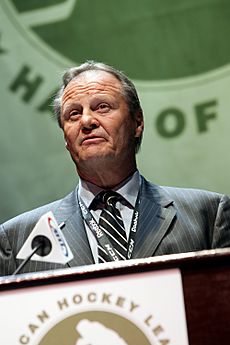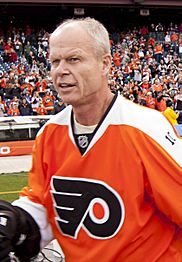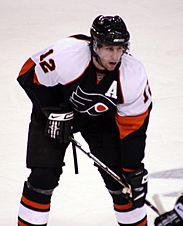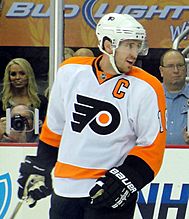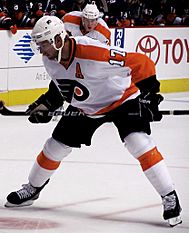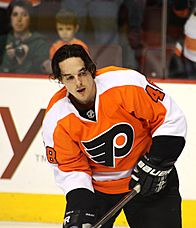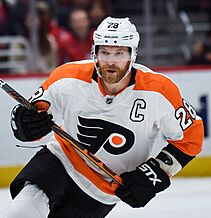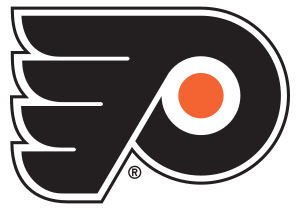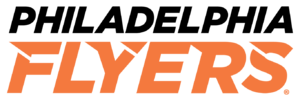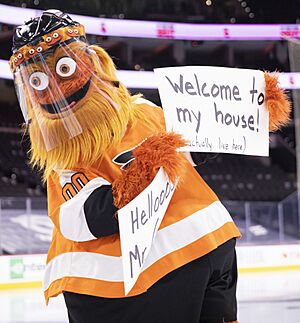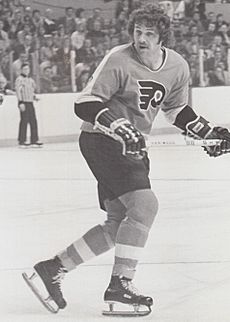Philadelphia Flyers facts for kids
Quick facts for kids Philadelphia Flyers |
|
|---|---|
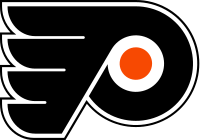 |
|
| Conference | Eastern |
| Division | Metropolitan |
| Founded | 1967 |
| History | Philadelphia Flyers 1967–present |
| Home arena | Wells Fargo Center |
| City | Philadelphia, Pennsylvania |
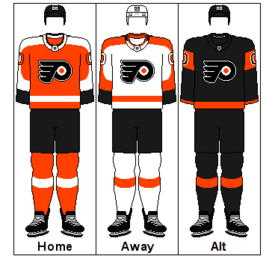 |
|
| Colors | Red orange, midnight black, frost white |
| Media | NBC Sports Philadelphia NBC Sports Philadelphia Plus< Peacock WPEN (97.5 The Fanatic) WMMR |
| Owner(s) | Comcast Spectacor |
| General manager | Daniel Briere |
| Head coach | Rick Tocchet |
| Captain | Sean Couturier |
| Minor league affiliates | Lehigh Valley Phantoms (AHL) Reading Royals (ECHL) |
| Stanley Cups | 2 (1973–74, 1974–75) |
| Conference championships | 8 (1974–75, 1975–76, 1976–77, 1979–80, 1984–85, 1986–87, 1996–97, 2009–10) |
| Presidents' Trophies | 0 |
| Division championships | 16 (1967–68, 1973–74, 1974–75, 1975–76, 1976–77, 1979–80, 1982–83, 1984–85, 1985–86, 1986–87, 1994–95, 1995–96, 1999–00, 2001–02, 2003–04, 2010–11) |
The Philadelphia Flyers are a professional ice hockey team. They are based in Philadelphia, Pennsylvania. The Flyers play in the National Hockey League (NHL). They are part of the Metropolitan Division in the Eastern Conference. Their home games are played at the Wells Fargo Center. This arena is also home to the Philadelphia 76ers (NBA) and Philadelphia Wings (NLL).
The Flyers joined the NHL in 1967 as an expansion team. They were the first expansion team to win the Stanley Cup. They won it in the 1973–74 season and again in the 1974–75 season. The Flyers have one of the best winning percentages in NHL history. They have also made many appearances in the conference finals.
The team has always played their home games on Broad Street. They played at the Spectrum from 1967 to 1996. Since 1996, they have played at the Wells Fargo Center. The Flyers have strong rivalries with several teams. Their biggest rivals include the New York Rangers and the Pittsburgh Penguins.
Contents
- Team History
- Team Look
- Season Records
- Players and Staff
- Honored Members
- Team Records
- Team Rivalries
- See also
Team History
Early Days in Philadelphia Hockey
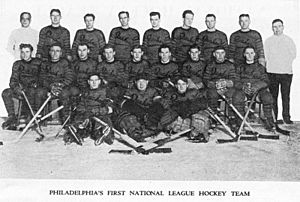
Before 1967, Philadelphia only had one NHL team. This was the Philadelphia Quakers in the 1930–31 season. They wore orange and black, just like today's Flyers. The Quakers had a very tough season, winning only 4 games. This is still the fewest wins ever for an NHL team in a season. The team stopped playing after that year.
In 1964, Ed Snider, who worked for the Philadelphia Eagles, saw how many fans wanted to see a hockey game in Boston. He realized Philadelphia could also support an NHL team. The NHL was looking to add new teams. Snider and his group were chosen over a group from Baltimore.
On April 4, 1966, a contest was announced to name the new team. Ed Snider's sister, Phyllis, suggested "Flyers." She thought it sounded good with Philadelphia. The team name was officially announced on August 3.
Starting Strong (1967–1971)
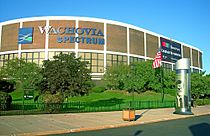
New teams in the NHL faced tough rules. They could not get the best players, who stayed with the "Original Six" teams. The Flyers picked players like Bernie Parent and Bobby Clarke. Many early Flyers players were from French-speaking Canada.
The Flyers played their first game on October 11, 1967. They lost 5–1 to the California Seals. A week later, they won their first game against the St. Louis Blues. Their first home game was on October 19, a 1–0 win against the Pittsburgh Penguins. Lou Angotti was the first team captain. The Flyers won their division in their first year. However, they lost in the first round of the playoffs.
The team struggled in their second season. Ed Snider wanted bigger, tougher players. This led to the team becoming known for its physical play. In 1969, the Flyers drafted Bobby Clarke, who became a star. They also drafted Dave Schultz, a future tough player.
On December 11, 1969, the Flyers started a special tradition. They began playing Kate Smith singing "God Bless America" before important games. Fans believed the team played better when her song was played.
The Broad Street Bullies (1971–1981)
The team started playing a more aggressive style. Bobby Clarke became a leader. In the 1972–73 season, the team earned the nickname "Broad Street Bullies." This name came from a newspaper after a tough game. Clarke became the youngest captain in NHL history at that time. Rick MacLeish was the first Flyer to score 50 goals in a season.
The Flyers won their first playoff series in 1973. Clarke won the Hart Memorial Trophy as the league's most valuable player.
Winning the Stanley Cup (1973–74)
Goaltender Bernie Parent returned to the team. In the 1973–74 season, the Flyers showed that expansion teams could win the Stanley Cup. Dave Schultz led the league in penalty minutes. The Flyers finished first in their division. Parent won 47 games, a record that stood for 33 years. He also shared the Vezina Trophy as the best goalie.
In the playoffs, the Flyers swept the Atlanta Flames. They then faced the New York Rangers in a tough seven-game series. The home team won every game. The Flyers won Game 7 at home, becoming the first expansion team to beat an Original Six team in a playoff series.
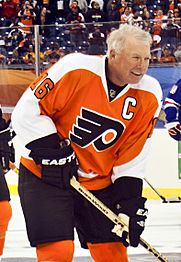
In the Stanley Cup Final, they played against Bobby Orr and the Boston Bruins. The Flyers won games 3 and 4 at home. Before Game 6, Kate Smith sang "God Bless America" in person. Rick MacLeish scored the first goal. The Flyers won, bringing the Stanley Cup to Philadelphia for the first time! Parent won the Conn Smythe Trophy as the playoff MVP.
Back-to-Back Champions (1974–75)
In the 1974–75 season, Dave Schultz set an NHL record with 472 penalty minutes. Clarke won his second Hart Trophy. Parent won the Vezina Trophy alone. The Flyers had the best record in the NHL. They swept the Toronto Maple Leafs in the playoffs. Then they faced the New York Islanders. The Flyers won the first three games, but the Islanders came back to tie the series. The Flyers won Game 7 to advance.
Facing the Buffalo Sabres in the Stanley Cup Final, the Flyers won the first two games. Game 3 was famous as "The Fog Game" because of heavy fog in the arena. The Flyers lost games 3 and 4. But they won Game 5 at home. In Game 6, Bob Kelly scored the winning goal. Parent had another shutout, and the Flyers won their second straight Stanley Cup! Parent also won his second Conn Smythe Trophy.
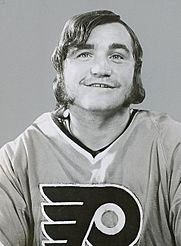
In the 1975–76 season, the Flyers played a famous exhibition game against the Soviet Union's Central Red Army team. The Soviets left the ice during the game because of the Flyers' physical play. They returned and the Flyers won 4–1. This made the Spectrum known as a very tough place to play.
The Flyers had their best season ever in 1975–76. The "LCB line" (Leach, Clarke, Barber) set an NHL record for goals. Clarke won his third Hart Trophy. The Flyers reached the Stanley Cup Final again. But they lost to the Montreal Canadiens in four games. Despite the loss, Reggie Leach won the Conn Smythe Trophy for scoring a record 19 playoff goals.
The "Broad Street Bullies" era began to end. Dave Schultz was traded. The Flyers continued to be strong, winning their division. But they lost in the playoffs to Boston. After the 1977–78 season, coach Fred Shero left.
In the 1979–80 season, the Flyers set a North American professional sports record. They went 35 games without a loss (25 wins, 10 ties). This record still stands today. They won their division and made it to the Stanley Cup Final. They faced the New York Islanders. The Flyers lost in six games. The final game was controversial because of an uncalled offside play.
A New Generation (1981–1991)
Many of the original "Broad Street Bullies" players left. New young stars joined the team. These included Brian Propp, Tim Kerr, Dave Poulin, Pelle Lindbergh, and Mark Howe. Howe became the team's top defenseman for many years.
The team struggled in the playoffs for a few years. After the 1983–84 season, Bobby Clarke retired as a player and became the team's general manager. Mike Keenan was hired as coach.
In the 1984–85 season, goalie Pelle Lindbergh led the NHL with 40 wins. He was the first European to win the Vezina Trophy. The Flyers won a team-record 53 games. They reached the Stanley Cup Final but lost to the Edmonton Oilers.
Sadly, Pelle Lindbergh died in a car accident in November 1985. The team played with great spirit after this tragedy. They had another strong season. But they lost in the first round of the playoffs.
In the 1986–87 season, 22-year-old goalie Ron Hextall became a star. He won the Vezina Trophy in his first season. The Flyers won their division again. They beat the New York Rangers and New York Islanders in the playoffs. Then they defeated the Montreal Canadiens to reach the Stanley Cup Final. They faced the Oilers again. The Flyers fought hard, coming back from a 3–1 series deficit to force Game 7. But they lost the final game. Hextall was named playoff MVP, even though his team lost.
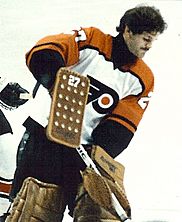
In the 1987–88 season, Hextall became the first NHL goalie to score a goal by shooting the puck into an empty net. The Flyers lost in the first round of the playoffs. Coach Keenan was fired. Paul Holmgren, a former Flyer, became the new coach.
The Flyers made the playoffs for 17 seasons in a row. But in the 1989–90 season, they missed the playoffs for the first time since 1972. Bobby Clarke was fired as general manager. The team continued to struggle with injuries to Hextall. They missed the playoffs again in the 1990–91 season.
Rebuilding the Team (1991–1994)
The Flyers acquired Rod Brind'Amour in 1991. He became a top scorer. Rick Tocchet was named captain. The team continued to struggle. Coach Holmgren was fired. The Flyers traded Tocchet for Mark Recchi. The team missed the playoffs for a third straight year.
In 1992, Bobby Clarke returned to the team as a senior vice president. The Flyers made a huge trade to get Eric Lindros, a highly talented young player. To get Lindros, the Flyers gave up many players and draft picks. Lindros became a big star in Philadelphia.
The "Crazy Eights" line was formed with Lindros, Recchi, and Brent Fedyk. In the 1992–93 season, Recchi set a team record with 123 points. Lindros scored 41 goals. But the team still missed the playoffs.
For the 1993–94 season, Terry Simpson was hired as coach. Recchi and Lindros continued to score many points. But the Flyers still did not make the playoffs.
Back to Being Contenders (1994–2004)
Ed Snider brought Bobby Clarke back as general manager in 1994. Clarke immediately made changes. Terry Murray became the new coach. Lindros was named captain. The Flyers traded Recchi to get defenseman Eric Desjardins and forward John LeClair. Goalie Ron Hextall also returned to the team.
The Legion of Doom (1994–1997)
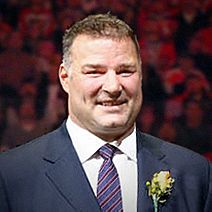
Lindros, LeClair, and Mikael Renberg formed a powerful line called the "Legion of Doom." They were known for both scoring and physical play. Lindros tied for the league scoring lead and won the Hart Memorial Trophy. The Flyers made the playoffs and won their division. They swept the New York Rangers but lost to the New Jersey Devils in the conference finals.
In the 1995–96 season, Lindros had 115 points. LeClair scored 51 goals. The Flyers won their division again. They won their first playoff series but lost to the Florida Panthers in the second round.
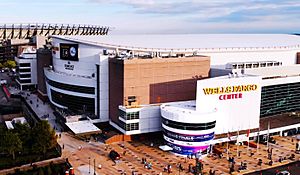
The Flyers moved to a new arena, the CoreStates Center, in 1996. In the 1996–97 season, LeClair scored 50 goals again. The Flyers dominated the first three rounds of the playoffs. They won the Eastern Conference and reached the Stanley Cup Final. But they were swept by the Detroit Red Wings. Coach Murray's contract was not renewed.
John LeClair scored 50 goals for a third straight year in the 1997–98 season. This was a first for an American-born player. The Flyers lost in the first round of the playoffs.
In the 1998–99 season, Eric Lindros suffered a serious lung injury. Without him, the Flyers struggled to score in the playoffs and lost in the first round.
The 1999–2000 season was very difficult. Longtime broadcaster Gene Hart died. Defenseman Dmitri Tertyshny died in a boating accident. Coach Roger Neilson was diagnosed with cancer. The team traded Rod Brind'Amour for Keith Primeau. Lindros had issues with the team's management and was stripped of his captaincy.
Despite these problems, the Flyers rallied. They won their division and the top seed in the East. They beat Buffalo and Pittsburgh in the playoffs. Primeau scored a goal in the fifth overtime of Game 4 against Pittsburgh, making it one of the longest playoff games ever. The Flyers took a 3–1 lead against the New Jersey Devils in the conference finals. But they lost the series in seven games. Lindros suffered another concussion in Game 7. He never played for the Flyers again.
In the 2001–02 season, the Flyers traded Eric Lindros to the Rangers. Keith Primeau became captain. The Flyers won their division. But they lost in the first round of the playoffs. Coach Bill Barber was fired. Ken Hitchcock was hired as the new coach.
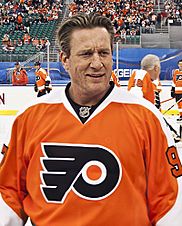
In the 2002–03 season, the Flyers had a strong goalie in Roman Cechmanek. They had a long, tough playoff series against Toronto, winning in seven games. But they lost to Ottawa in the second round.
In the 2003–04 season, the Flyers won their division. They had a famous game against Ottawa with a record 419 penalty minutes. Goalie Robert Esche and captain Keith Primeau led the team in the playoffs. They beat the Devils and Toronto. But they lost to the Tampa Bay Lightning in Game 7 of the conference finals.
Ups and Downs (2004–2014)
The NHL lockout canceled the 2004–05 season. When hockey returned, the Flyers made many changes. They signed superstar Peter Forsberg and defensemen Derian Hatcher and Mike Rathje.
The 2005–06 NHL season started well. The "Deuces Wild" line of Forsberg, Gagne, and Mike Knuble scored many points. But injuries hurt the team, especially a season-ending concussion to Keith Primeau. The Flyers lost in the first round of the playoffs.
The 2006–07 season was the worst in Flyers history. They had many losing streaks. General manager Bobby Clarke resigned, and coach Ken Hitchcock was fired. The team finished with the worst record in the league. They lost the draft lottery and picked second overall in the 2007 draft.
General manager Paul Holmgren began rebuilding the team. They traded Peter Forsberg and other players. They acquired goalie Martin Biron and signed Kimmo Timonen and Scott Hartnell. They drafted James van Riemsdyk.
Before the 2007–08 season, the Flyers signed star player Daniel Briere. They also acquired Jason Smith, who became captain. The team had a tough start with many player suspensions. But they made the playoffs as the sixth seed. They upset Washington and Montreal. They reached the conference finals but lost to Pittsburgh in five games.
In the 2008–09 season, Mike Richards became captain. The team played inconsistently. They lost to Pittsburgh in the first round of the playoffs.
The 2009–10 season saw more changes. They acquired defenseman Chris Pronger. Coach John Stevens was replaced by Peter Laviolette. Injuries hit the team hard, especially goalies. Seven different goalies played for the Flyers that year. They made the playoffs on the last day of the season.
In the playoffs, the Flyers upset New Jersey. But they suffered more injuries. They faced Boston in the second round and fell behind 3–0 in the series. But the Flyers made an amazing comeback! They won four straight games, including Game 7 in Boston, to win the series. This was one of the biggest comebacks in sports history.
The Flyers then beat Montreal to win the Eastern Conference Championship. They reached the Stanley Cup Final for the first time since 1997. They faced the Chicago Blackhawks. The series was close, but Chicago won in six games. Briere led the playoffs in scoring with 30 points.
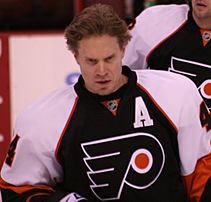
In the 2010–11 season, the Flyers won their division. They had a young goalie, Sergei Bobrovsky. They beat Buffalo in the first round of the playoffs. But they lost to Boston in the second round, again being swept.
In 2011, the Flyers made big trades. They traded Mike Richards and Jeff Carter. They signed goalie Ilya Bryzgalov to a long contract. Chris Pronger was named captain but suffered a career-ending concussion. Claude Giroux became a star player. The Flyers upset Pittsburgh in the first round of the 2012 playoffs. But they lost to New Jersey in the second round.
The 2012–13 season was shorter due to a lockout. Claude Giroux was named captain. The team missed the playoffs for the first time in six years. The Flyers bought out Bryzgalov and Briere's contracts.
In the 2013–14 season, coach Peter Laviolette was fired after three games. Craig Berube became the new coach. The team made the playoffs but lost to the New York Rangers in seven games.
Recent Years (2014–Present)
In 2014, Paul Holmgren became president, and Ron Hextall became general manager. Hextall wanted to build the team with young players. The Flyers missed the playoffs in the 2014–15 season. Coach Berube was fired. Dave Hakstol was hired as the new coach.
In the 2015–16 season, the Flyers made a strong comeback in the second half. They clinched a playoff spot on the second-to-last day. They lost to Washington in six games in the first round.
On April 11, 2016, Ed Snider, the team's co-founder, passed away. In the 2016–17 season, the Flyers won ten games in a row. But they still missed the playoffs.
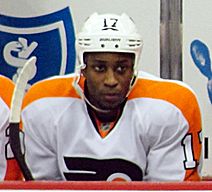
The Flyers won the second overall pick in the 2017 NHL entry draft lottery. They picked Nolan Patrick. In the 2017–18 season, the Flyers made the playoffs but lost to Pittsburgh. Claude Giroux had a 100-point season.
In the 2018–19 season, Ron Hextall was fired as general manager. Dave Hakstol was fired as coach. Chuck Fletcher became the new general manager. The team removed the statue of Kate Smith and stopped playing her song due to past issues. The Flyers missed the playoffs.
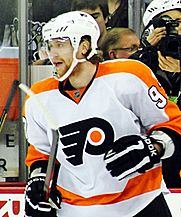
For the 2019–20 season, Alain Vigneault was hired as coach. The team played well and had a nine-game winning streak. The season was paused due to the COVID-19 pandemic. The Flyers were second in their division.
In the 2020 playoffs, the Flyers were the top seed in the Eastern Conference. They beat Montreal in six games. But they lost to the New York Islanders in seven games in the second round.
The 2020–21 season was shorter. The Flyers started strong but then struggled. They finished with the most goals scored against in the league and missed the playoffs. The team made many trades to improve. They acquired defensemen Ryan Ellis and Rasmus Ristolainen. They also traded for forward Cam Atkinson.
The 2021–22 season started okay, but injuries hurt the team. Ryan Ellis was out for the season. Coach Alain Vigneault was fired and replaced by Mike Yeo. The team had a franchise-record 13-game losing streak. Sean Couturier was also out for the season with an injury. Claude Giroux played his 1,000th game as a Flyer. He was then traded to the Florida Panthers. The team missed the playoffs.
John Tortorella was hired as the new head coach for the 2022–23 season. Ryan Ellis and Sean Couturier were both out for the entire season due to injuries. The team had a good start but then had a ten-game winless streak. General manager Chuck Fletcher was fired. Daniel Briere became the interim general manager. The team missed the playoffs for a third year in a row.
After the 2022–23 season, the team made big changes to its management. Former Flyer Keith Jones became president of hockey operations. Daniel Briere was named the permanent general manager.
Team Look
Colors, Name, and Logo
On April 4, 1966, the team announced its colors: orange, black, and white. These colors were chosen because they were "hot" and matched the orange and black of the old Philadelphia Quakers team. A contest was held to name the team.
Ed Snider's sister, Phyllis, suggested "Flyers." She thought it fit Philadelphia and the speed of hockey. On August 3, 1966, "Flyers" was announced as the team name. A nine-year-old boy named Alec Stockard, who had suggested "Fliers," won the contest.
An advertising firm designed the team's logo and jerseys. The logo is a winged "P" with an orange dot for a puck. The wings represent speed. This "flying P" logo has stayed almost the same since 1967. It was ranked as one of the best NHL logos.
Jerseys
The first jerseys were orange for home games and white for away games. They had stripes on the shoulders and arms, like wings. This design was used until 1982.
New jerseys were introduced in 1982. They had wider stripes and black trim. Later, a black jersey replaced the orange as the main dark jersey. In 2002, a new orange third jersey was introduced. It had a different design and used silver/gray for the first time.
In 2007, the NHL introduced new jerseys. The Flyers' black jersey had white shoulders. The white jersey had orange shoulders. In 2008, a new orange third jersey was brought back, based on their 1973–74 design. This orange jersey became the main home jersey in 2009.
For the 2010 Winter Classic, the Flyers wore a special white jersey. This jersey became their main road jersey for the next season. In 2012, for another Winter Classic, they wore a traditional orange jersey with cream and black colors. This design later became a third jersey.
For their 50th anniversary in 2016–17, the Flyers wore a special white jersey with gold numbers. In 2017, they wore a black uniform for the Stadium Series game. This black uniform became a third jersey option.
For the 2019 Stadium Series, the Flyers wore orange and black uniforms without white. In 2020–21, they released a "Reverse Retro" jersey, which was a modern take on their old dark orange jersey. Another "Reverse Retro" jersey was released in 2022–23, based on their early 1980s uniforms but with different colors.
For the 2023–24 season, the Flyers updated their main uniforms. They went back to a burnt orange color and added wider stripes. The black alternate jersey was also kept. For the 2024 Stadium Series, they wore a white uniform with thick black and orange stripes.
Cooperall Pants
The Flyers were one of only two NHL teams to wear Cooperalls in 1981–82. These were hockey pants that went all the way down to the ankles. They wore them for two seasons. But Cooperalls were banned from the NHL for safety reasons.
Mascots
The Flyers had a short-lived mascot named "Slapshot" in 1976. On September 24, 2018, the Flyers introduced their new mascot, "Gritty". Gritty is a seven-foot-tall, fuzzy orange creature.
Season Records
This is a partial list of the last five seasons completed by the Flyers.
Note: GP = Games played, W = Wins, L = Losses, OTL = Overtime Losses, Pts = Points, GF = Goals for, GA = Goals against
| Season | GP | W | L | OTL | Pts | GF | GA | Finish | Playoffs |
| 2020–21 | 56 | 25 | 23 | 8 | 58 | 163 | 201 | 6th, East | Did not qualify |
| 2021–22 | 82 | 25 | 46 | 11 | 61 | 211 | 298 | 8th, Metropolitan | Did not qualify |
| 2022–23 | 82 | 31 | 38 | 13 | 75 | 222 | 277 | 7th, Metropolitan | Did not qualify |
| 2023–24 | 82 | 38 | 33 | 11 | 87 | 235 | 261 | 6th, Metropolitan | Did not qualify |
| 2024–25 | 82 | 33 | 39 | 10 | 76 | 238 | 286 | 8th, Metropolitan | Did not qualify |
Players and Staff
Team Captains
- Lou Angotti, 1967–1968
- Ed Van Impe, 1968–1973
- Bobby Clarke, 1973–1979
- Mel Bridgman, 1979–1981
- Bill Barber, 1981–1983
- Bobby Clarke, 1983–1984
- Dave Poulin, 1984–1989
- Ron Sutter, 1989–1991
- Rick Tocchet, 1991–1992
- Kevin Dineen, 1993–1994
- Eric Lindros, 1994–2000
- Eric Desjardins, 2000–2001
- Keith Primeau, 2001–2006
- Derian Hatcher, 2006
- Peter Forsberg, 2006–2007
- Jason Smith, 2007–2008
- Mike Richards, 2008–2011
- Chris Pronger, 2011–2013
- Claude Giroux, 2013–2022
- Sean Couturier, 2024–present
Head Coaches
- Keith Allen, 1966–1969
- Vic Stasiuk, 1969–1971
- Fred Shero, 1971–1978
- Bob McCammon, 1978–1979
- Pat Quinn, 1979–1982
- Bob McCammon, 1982–1984
- Mike Keenan, 1984–1988
- Paul Holmgren, 1988–1991
- Bill Dineen, 1991–1993
- Terry Simpson, 1993–1994
- Terry Murray, 1994–1997
- Wayne Cashman, 1997–1998
- Roger Neilson, 1998–2000
- Craig Ramsay, 2000
- Bill Barber, 2000–2002
- Ken Hitchcock, 2002–2006
- John Stevens, 2006–2009
- Peter Laviolette, 2009–2013
- Craig Berube, 2013–2015
- Dave Hakstol, 2015–2018
- Scott Gordon (interim), 2018–2019
- Alain Vigneault, 2019–2021
- Mike Yeo (interim), 2021–2022
- John Tortorella, 2022–2025
- Brad Shaw (interim), 2025
- Rick Tocchet, 2025–present
General Managers
- Bud Poile, 1966–1969
- Keith Allen, 1969–1983
- Bob McCammon, 1983–1984
- Bobby Clarke, 1984–1990
- Russ Farwell, 1990–1994
- Bobby Clarke, 1994–2006
- Paul Holmgren, 2006–2014
- Ron Hextall, 2014–2018
- Chuck Fletcher, 2018–2023
- Daniel Briere, 2023–present
First-Round Draft Picks
- 1967: Serge Bernier (5th overall)
- 1968: Lew Morrison (8th overall)
- 1969: Bob Currier (6th overall)
- 1971: Larry Wright (8th overall), Pierre Plante (9th overall)
- 1972: Bill Barber (7th overall)
- 1975: Mel Bridgman (1st overall)
- 1976: Mark Suzor (17th overall)
- 1977: Kevin McCarthy (17th overall)
- 1978: Behn Wilson (6th overall), Ken Linseman (7th overall), Danny Lucas (14th overall)
- 1979: Brian Propp (14th overall)
- 1980: Mike Stothers (21st overall)
- 1981: Steve Smith (16th overall)
- 1982: Ron Sutter (4th overall)
- 1985: Glen Seabrooke (21st overall)
- 1986: Kerry Huffman (20th overall)
- 1987: Darren Rumble (20th overall)
- 1988: Claude Boivin (14th overall)
- 1990: Mike Ricci (4th overall)
- 1991: Peter Forsberg (6th overall)
- 1992: Ryan Sittler (7th overall)
- 1995: Brian Boucher (22nd overall)
- 1996: Dainius Zubrus (15th overall)
- 1998: Simon Gagne (22nd overall)
- 1999: Maxime Ouellet (22nd overall)
- 2000: Justin Williams (28th overall)
- 2001: Jeff Woywitka (27th overall)
- 2002: Joni Pitkanen (4th overall)
- 2003: Jeff Carter (11th overall), Mike Richards (24th overall)
- 2005: Steve Downie (29th overall)
- 2006: Claude Giroux (22nd overall)
- 2007: James van Riemsdyk (2nd overall)
- 2008: Luca Sbisa (19th overall)
- 2011: Sean Couturier (8th overall)
- 2012: Scott Laughton (20th overall)
- 2013: Samuel Morin (11th overall)
- 2014: Travis Sanheim (17th overall)
- 2015: Ivan Provorov (7th overall), Travis Konecny (24th overall)
- 2016: German Rubtsov (22nd overall)
- 2017: Nolan Patrick (2nd overall), Morgan Frost (27th overall)
- 2018: Joel Farabee (14th overall), Jay O'Brien (19th overall)
- 2019: Cam York (14th overall)
- 2020: Tyson Foerster (23rd overall)
- 2022: Cutter Gauthier (5th overall)
- 2023: Matvei Michkov (7th overall), Oliver Bonk (22nd overall)
- 2024: Jett Luchanko (13th overall)
- 2025: Porter Martone (6th overall), Jack Nesbitt (12th overall)
Honored Members
Hockey Hall of Fame
Many people connected to the Flyers are in the Hockey Hall of Fame. This includes 14 former players and seven people who helped build the sport. The builders include general managers, coaches, and owners. Bernie Parent was the first Flyer player inducted in 1984.
Players
- Bill Barber
- Bobby Clarke
- Paul Coffey
- Peter Forsberg
- Dale Hawerchuk
- Mark Howe
- Eric Lindros
- Adam Oates
- Bernie Parent
- Chris Pronger
- Mark Recchi
- Jeremy Roenick
- Darryl Sittler
- Allan Stanley
Builders
- Keith Allen
- Ken Hitchcock
- Roger Neilson
- Bud Poile
- Pat Quinn
- Fred Shero
- Ed Snider
Retired Numbers
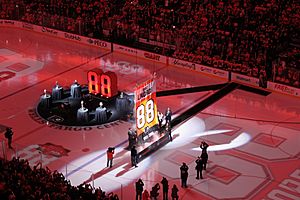
The Flyers have retired six jersey numbers. This means no other player can wear them. Barry Ashbee's number 4 was retired after he passed away. Bernie Parent's number 1 and Bobby Clarke's number 16 were retired soon after they stopped playing. Bill Barber's number 7 and Mark Howe's number 2 were retired after they entered the Hockey Hall of Fame. Number 31, last worn by Pelle Lindbergh, was taken out of use after his death. The NHL retired Wayne Gretzky's number 99 for all teams. In 2018, the Flyers retired Eric Lindros' number 88.
| No. | Player | Position | Career | Date of retirement |
|---|---|---|---|---|
| 1 | Bernie Parent | Goaltender | 1967–1971, 1973–1979 | October 11, 1979 |
| 2 | Mark Howe | Defense | 1982–1992 | March 6, 2012 |
| 4 | Barry Ashbee | Defense | 1970–1974 | October 13, 1977 |
| 7 | Bill Barber | Left wing | 1972–1984 | October 11, 1990 |
| 16 | Bobby Clarke | Center | 1969–1984 | November 15, 1984 |
| 88 | Eric Lindros | Center | 1992–2000 | January 18, 2018 |
Flyers Hall of Fame
The Flyers Hall of Fame started in 1988. It honors people who helped the team succeed. A group of media members and team officials vote on who gets in. So far, 28 former players and executives have been inducted.
- Bobby Clarke and Bernie Parent, 1988
- Keith Allen, Bill Barber and Ed Snider, 1989
- Rick MacLeish and Fred Shero, 1990
- Barry Ashbee and Gary Dornhoefer, 1991
- Gene Hart and Reggie Leach, 1992
- Joe Scott and Ed Van Impe, 1993
- Tim Kerr, 1994
- Joe Watson, 1996
- Brian Propp, 1999
- Mark Howe, 2001
- Dave Poulin, 2004
- Ron Hextall, 2008
- Dave Schultz, 2009
- John LeClair and Eric Lindros, 2014
- Eric Desjardins and Rod Brind'Amour, 2015
- Jimmy Watson, 2016
- Rick Tocchet and Paul Holmgren, 2021
- Mark Recchi, 2024
Team Records
Top Scorers
These are the top-ten players with the most points in Flyers history.
- * – current Flyers player
Note: Pos = Position; GP = Games played; G = Goals; A = Assists; Pts = Points; P/G = Points per game
|
|
|
Top Goaltenders
These are the top-ten goalies in Flyers history by wins.
- * – current Flyers player
Note: GP = Games played; W = Wins; L = Losses; T = Ties; OT = Overtime losses; GA = Goal against; GAA = Goals against average; SA = Shots against; SV% = Save percentage; SO = Shutouts
| Player | GP | W | L | T | OT | GA | GAA | SA | SV% | SO |
|---|---|---|---|---|---|---|---|---|---|---|
| Ron Hextall | 489 | 240 | 172 | 58 | — | 1,367 | 2.91 | 13,026 | .895 | 18 |
| Bernie Parent | 486 | 232 | 141 | 104 | — | 1,141 | 2.43 | 13,820 | .917 | 50 |
| Steve Mason | 231 | 104 | 78 | — | 36 | 540 | 2.47 | 6,614 | .918 | 14 |
| Carter Hart | 227 | 96 | 93 | — | 29 | 625 | 2.94 | 6,630 | .906 | 6 |
| Wayne Stephenson | 165 | 93 | 35 | 22 | — | 424 | 2.77 | 4,114 | .897 | 10 |
| Roman Cechmanek | 163 | 92 | 43 | 22 | — | 306 | 1.96 | 3,963 | .923 | 20 |
| Bob Froese | 144 | 92 | 29 | 12 | — | 370 | 2.74 | 3,678 | .899 | 12 |
| Pelle Lindbergh | 157 | 87 | 49 | 15 | — | 503 | 3.31 | 4,432 | .887 | 7 |
| Pete Peeters | 179 | 85 | 57 | 20 | — | 532 | 3.20 | 4,751 | .888 | 5 |
| Doug Favell | 215 | 76 | 87 | 37 | — | 559 | 2.79 | 6,746 | .917 | 16 |
Single Season Records
Regular Season Records
- Most goals in a season – Reggie Leach, 61 (1975–76)
- Most assists in a season – Bobby Clarke, 89 (1974–75, 1975–76)
- Most points in a season – Mark Recchi, 123 (1992–93)
- Most penalty minutes in a season – Dave Schultz, 472 (1974–75, NHL record)
- Most points in a season by a defenseman – Mark Howe, 82 (1985–86)
- Most points in a season by a rookie – Mikael Renberg, 82 (1993–94)
- Most power play goals in a season – Tim Kerr, 34 (1985–86, NHL record)
- Most wins in a season by a goalie – Bernie Parent, 47 (1973–74)
- Most shutouts in a season by a goalie – Bernie Parent, 12 (1973–74, 1974–75)
Playoff Records
- Most goals in playoffs – Reggie Leach, 19 (1975–76, NHL record)
- Most assists in playoffs – Pelle Eklund, 20 (1986–87)
- Most points in playoffs – Daniel Briere, 30 (2009–10)
- Most penalty minutes in playoffs – Dave Schultz, 139 (1973–74)
- Most points in playoffs by a defenseman – Doug Crossman (1986–87) and Chris Pronger (2009–10), 18
- Most points in playoffs by a rookie – Ville Leino, 21 (2009–10, NHL record)
- Most power play goals in playoffs – Tim Kerr, 8 (1988–89)
- Most wins in a playoffs by a goalie – Ron Hextall, 15 (1986–87)
- Most shutouts in playoffs by a goalie – Bernie Parent, 4 (1974–75)
Team Records
- Most points in a season – 118 (1975–76)
- Most wins in a season – 53 (1984–85, 1985–86)
- Most goals scored – 350 (1983–84)
- Fewest goals allowed (full season) – 164 (1973–74)
- Longest undefeated streak – 35 games (1979–80, NHL record)
Team Rivalries
New Jersey Devils
The Flyers and New Jersey Devils have a strong rivalry. They often competed for the Atlantic Division title.
New York Islanders
The Flyers and New York Islanders had intense playoff battles in the 1970s and 1980s.
New York Rangers
The Flyers and New York Rangers have a long and intense rivalry that goes back to the 1970s.
Pittsburgh Penguins
The rivalry between the Flyers and Pittsburgh Penguins is known as the "Battle of Pennsylvania." Many consider it one of the best rivalries in the NHL. Both teams joined the league in 1967. The Flyers were successful early on, while the Penguins struggled. The Penguins did not win a game at the Spectrum against the Flyers for 42 games, from 1974 to 1989.
The teams first met in the playoffs in 1989. The Flyers won that series. They met again in 1997, and the Flyers won again. Penguins legend Mario Lemieux retired after that series. The Flyers also beat the Penguins in the 2000 playoffs. That series included a game that went into five overtimes, one of the longest playoff games ever.
The Penguins got their first playoff win against the Flyers in 2008. They won again in 2009. The rivalry became even more heated in the 2012 playoffs. The two teams combined for a record 45 goals in the first four games. Game 3 had 158 penalty minutes. The Flyers won that series. The Penguins defeated the Flyers in the 2018 playoffs. This rivalry has also been featured in outdoor Stadium Series games.
Washington Capitals
The Flyers and Washington Capitals have been rivals since their days in the Patrick Division.
See also
 In Spanish: Philadelphia Flyers para niños
In Spanish: Philadelphia Flyers para niños


